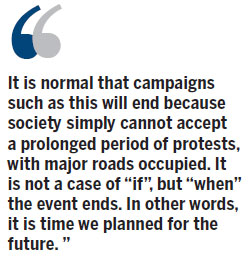'Occupy' will leave HK society divided
Updated: 2014-10-09 07:54
By Raymond So(HK Edition)
|
|||||||

The "Occupy Central" campaign has now developed into other forms of protest. As the campaign moves into its second week, some members of society are expressing their anger at the inconvenience the campaign has caused. Small businesses are complaining about their financial losses and parents are complaining about the blockades on their children's way to school. It is true that on the whole the event so far continues to be peaceful. However, the inconvenience caused is now testing the patience of the public. As shown by the protests in Mong Kok, a small spark can grow into a large flame of confrontation. Our police officers have shown great professionalism in upholding the law during angry, difficult times in Hong Kong.
But it is normal that campaigns such as this will end because society simply cannot accept a prolonged period of protests, with major roads occupied. It is not a case of "if", but "when" the event ends. In other words, it is time we planned for the future.
Clearly society is more divided than ever owing to such strong differences of opinion. This is not surprising because similar situations have occurred before. In 1960s and 1970s, for example, the United States was greatly divided by anti-Vietnam war protests. Many young people protested against the US government's involvement in the Vietnam War - arguing that it was "unethical". College students also occupied schools and boycotted classes. Many parents of protesters, however, did not share these views. The older generation had lived through World War II and had a strong sense of patriotism. Frequently, people of different viewpoints would argue passionately over the Vietnam War. Does this sound familiar to what is happening in Hong Kong?
Many older people in this city have experienced the days when Hong Kong was still under British rule. This experience has given these people a broader perspective on the situation today. At that time, Hong Kong had no democracy, and the British simply treated Hong Kong as the goose which laid the golden egg. Many aspects of society were unfair and unjust. It was not until the 1970s that the Hong Kong government started to implement better policies and the economy began to develop. People who witnessed this era therefore treasure what Hong Kong has achieved.

However, it may not be the same for young people. They grew up in a period of prosperity when Hong Kong society experienced stability. Young people tend, by nature, to be idealists. This idealism and youthful passion may often lead to confrontations between different groups of people. Yellow and blue ribbons illustrate these differences.
Further division in society will be the outcome of these confrontations. Moreover, some local media outlets have made irresponsible, inaccurate claims about the police. During initial conflict between the pro- and anti-"Occupy Central" groups, some triad members were seen among crowds of the anti-"Occupy" group. Some irresponsible media immediately suggested these anti-"Occupy" crowds were triad members and the police were cooperating with triad gangsters. Although this was later clarified and shown to be untrue, this clarification was largely overlooked. Those who support "Occupy" have a perception the police treated them unfairly. So mistrust of the police and the government is now greater than before.
At present, many people are "unfriending" their friends on Facebook if they do not share their views on "Occupy". Some of my students have even said that they will leave home because of differences with their parents over politics. In a society where democracy is cherished, we may not agree with other people, but should nevertheless respect other people's rights when expressing their views.
However, the sad thing is this is not the case now in Hong Kong. People have strong views, and they cannot listen to or try to understand people with different views. In such circumstances society becomes polarized as a result.
But as noted above, "Occupy" will come to an end. Life goes on and business has to return to normal. But what is next? We now have a society with deep divisions. The wounds can be healed, but the scars will remain. The two opposing political camps may attempt to exact revenge in the future. The "Occupy" campaign is only the start and more activities will definitively occur in future. The government faces the potential risk of being paralyzed in some of its operations.
The author is dean of the School of Business at Hang Seng Management College.
(HK Edition 10/09/2014 page1)